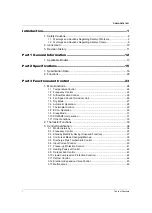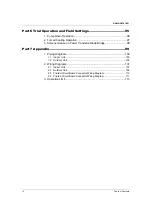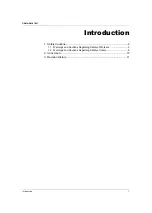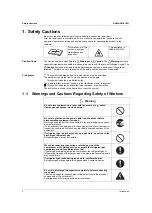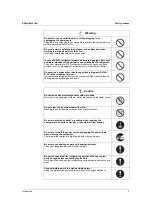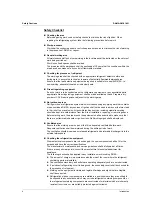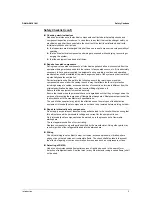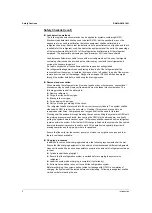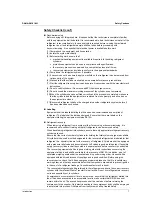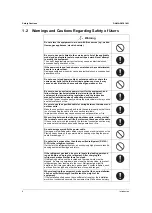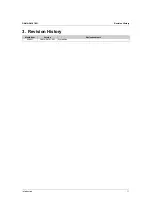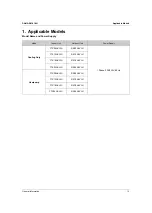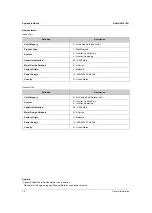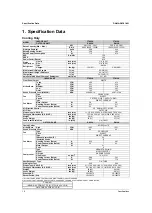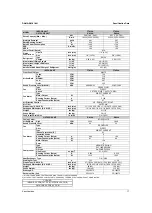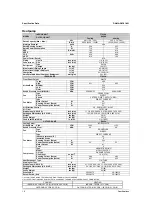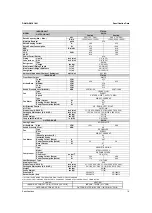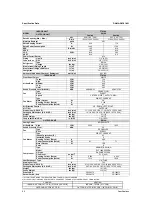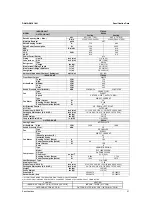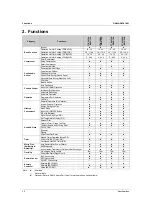
DAMA-SM-21-001
Safety Cautions
Introduction
7
Safety Checklist (con't)
Decommissioning
Before carrying out this procedure, it is essential that the technician is completely familiar
with the equipment and all its details. It is recommended to train technicians so that all of the
refrigerant is recovered safely. In case analysis is required before re-using the reclaimed
refrigerant, an oil and refrigerant sample shall be taken before proceeding with
decommissioning. It is essential that electrical power is available before work.
(1) Comprehend the equipment and its operation.
(2) Isolate the system electrically.
(3) Before starting work, ensure that:
mechanical handling equipment is available if required, for handling refrigerant
cylinders;
protective equipment can be used in compliance with specifications;
the recovery process is supervised by a competent person at all times;
recovery equipment and cylinders conform to the appropriate standards.
(4) Pump down the refrigerant system, if possible.
(5) If vacuum can not be ensured, apply a manifold so that refrigerant can be removed from
various parts of the system.
(6) Make sure that the cylinder is situated on the scale before recovery takes place.
(7) Start the refrigerant recovery device and operate it in accordance with the manufacturer's
instructions.
(8) Do not overfill cylinders. (Do not exceed 80% liquid charge volume).
(9) Do not exceed the maximum working pressure of the cylinder, even temporarily.
(10)When the cylinders have been filled correctly and the process is completed, make sure
that the cylinders and the equipment are removed from site promptly and all valves on
the equipment are closed.
(11)Recovered refrigerant shall not be charged into another refrigeration system before it
has been cleaned and checked.
Labelling
Equipment shall be labelled stating that it has been decommissioned and emptied of
refrigerant. The label shall be dated and signed. Ensure that there are labels on the
equipment stating the equipment contains R410A.
Refrigerant recovery
When removing refrigerant from a system, either for servicing or decommissioning, it is
recommended to conduct training so that all refrigerants can be removed safely.
When transferring refrigerant into cylinders, ensure that only appropriate refrigerant recovery
cylinders are used.
Ensure that the correct number of cylinders for holding the total system charge are available.
All cylinders to be used must be designated for the recovered refrigerant and labelled for that
refrigerant (i.e. special cylinders for the recovery of refrigerant). Cylinders shall be equipped
with a pressure relief valve and associated shut-off valves in good working order. If possible,
empty recovery cylinders shall be cooled in a separate place before recovery is conducted.
The recovery equipment shall be in good working order with instructions concerning the
equipment at hand, and shall be suitable for the recovery of R410A. In addition, a set of
calibrated weighing scales shall be available and in good working order. Hoses shall be
equipped with leak-free disconnect couplings and in good condition. Before using the
recovery device, check that it has undergone proper maintenance, that it is in satisfactory
working order, and that any associated electrical components are sealed to prevent ignition
in the event of a refrigerant leakage. Consult manufacturer if in doubt.
The recovered refrigerant shall be returned to the refrigerant supplier in the correct recovery
cylinder, with the relevant Waste Transfer Note attached. Do not mix refrigerants in recovery
units and especially not in cylinders.
If compressors or compressor oil are to be removed, ensure that the refrigerant melted into
the oil has been evacuated to an acceptable level to make certain that R410A does not
remain within the oil. The evacuation process shall be carried out before returning the
compressor to the supplier. Only electric heating to the compressor body shall be employed
to accelerate this process. Oil drained from the system shall be treated safely.
Summary of Contents for FTK Series
Page 2: ......



